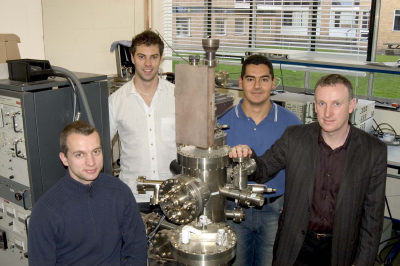Lancaster takes lead in Micro & Nano Technology programme

Professor Andrew Richardson (far right) and his research team
(from left), Richard Rosing, Dr Carl Jeffrey, Rueben Cutajar.
Lancaster University’s Engineering Department is spearheading a new Europe-wide micro and nano technology initiative. The Department’s Centre for Microsystems Engineering is leading a programme that involves 24 research centres combining their resources to carry out leading research into methods of building micro and nano scale components into commercial products. The programme will also launch support services across Europe for manufacturers of these products. The project, which will run for four years, will receive 6.2M€ - around £4.5m – of funding from the European Commission.
The initiative is the brainchild of Dr Andrew Richardson, group leader of the Centre for Microsystems Engineering and project co-ordinator for the new programme. He said: “After four years our hope is to have established a new community of researchers and their organisations, able to provide industry with world leading research, innovation and support services. Micro and nano technology involves studying and working with devices on a scale of between a few thousandths and one-millionth of a millimeter.
“It is an extension of the silicon chip that allows both sensors and actuators to be combined with microelectronics and sophisticated bio-chemical materials,” said Dr Richardson.
“Micro and nano technology has opened up a whole new range of applications, for example, chips over which you can pass fluids for genetic analysis or intelligent sensors to improve safety in cars. More bizarre, perhaps, is the concept of clothes that can be programmed with colour and pattern.”
But although micro and nano technology exists in the research laboratory, transferring it into a commercial environment is complex, and guaranteeing that all component parts will work under all conditions that typical products encounter is a massive challenge.
“These devices are extremely sensitive with even tiny amounts of stress causing complete failure. Many applications also target environments where there are contaminants, vibration or large temperature changes. Guaranteeing that the products that use this technology are reliable enough to satisfy the market and consumer is difficult,” said Dr Richardson.
The new programme aims to improve interaction between different teams in order to implement a design methodology that will increase the rate of success and shorten time to market for future micro and nano technology based products.
The initiative also aims to ensure that any problems affecting the manufacture and reliability of micro and nano technology based products can be addressed before prototype and pre-production.
“It will provide direct services to industry with an emphasis on small and medium sized companies in the form of a one-stop shop,” said Dr Richardson.
“These services will be based on the combined skills and resources of the new technical community formed by the project.
“Lancaster University has been working in this field for ten years, with major support from the Northwest Development Agency which has helped put the team in a leading position in Europe to build this new community. The Lancaster team is also a key partner in a new Innovative Electronics Manufacturing Centre that has recently been awarded a grant of £5m from the Engineering and Physical Sciences Research Council that will contribute to the goal of bringing this new technology to the market place.”